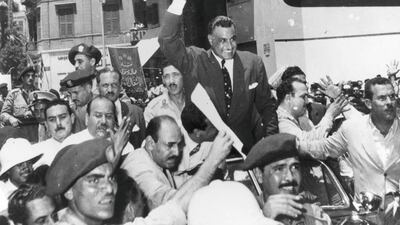The clash referred to in the title of Fawaz Gerges' new book Making the Arab World: Nasser, Qutb, and the Clash That Shaped the Middle East is writ both small and large throughout the pages of his study, the decades-long clash between Arab nationalism and revanchist Islamism that has convulsed large parts of the Arab world for most of the last century, but it has an obvious flashpoint: Egypt.
In the aftermath of Egyptian president Hosni Mubarak's 2011 resignation, Mohamed Morsi of the Ikhwan, or Muslim Brotherhood, was elected president – an election that quickly elicited massive nationwide protests that broke right along the rift Gerges outlines. Morsi and his Brotherhood apparatchiks made no secret of their desire to push through a sweeping legislative revamp that struck many observers as a grab to cement power. Secular and popular resentment to Morsi's rule became increasingly heated, and in 2013 the Egyptian military removed Morsi from office and dismantled his organisation. The story highlights fault lines and those are the focus of Making the Arab World. Gerges, a scholar of Middle East Studies at the London School of Economics and Political Science and the author of a history of ISIL, writes with brilliant insight about these two competing forces in the Arab world: pan-nationalism and pan-Islamist movements. He digs to the roots of the conflict in Egypt.
The genius of the book is Gerges' decision to centre this conflict not in theology or sociology but biography. The heart of Making the Arab World is the story of two men whose lives would go on to epitomise either side of the conflict. On one side stands Gamal Abdel Nasser, the lightning-rod Egyptian president and Arab nationalist leader who overthrew the monarchy in 1952 and, in a broad programme of progressive reforms, led his country to a position of leadership in the Arab world. On the other side stands Sayyid Qutb, Egyptian writer and profoundly influential thinker in the upper echelons of the Muslim Brotherhood of the day.
Nasser stands in the popular imagination as the charismatic embodiment of the westernising urge of Arab nationalism, the smiling face of modern reform from his assumption of power to his death in 1970, and Qutb's many followers characterise him as an Islamist purist, the ideological beacon of the Ikhwan, who was convicted of conspiring to assassinate Nasser and hanged in 1966.
The gap between the two men would seem to be unbridgeable, but Gerges embarks on a dual biography to see if that is genuinely the case. He consults many sources and conducts many interviews with partisans of both camps. The portraits that emerge of these two men are revelatory.
In a 1959 Christian Science Monitor interview, Nasser clarified his original vision of national rebirth: "I saw that those things which should have been our strengths, such as our geographical position, or the oil of the area, were used as justification for occupying us." To throw off that occupation, he was willing to use any tools at his disposal, including religious conviction (Gerges gives readers a Nasser free of pietism), but in these pages there are richer dimensions to this opportunism. Nasser, according to Gerges, "instrumentalised the sacred imagination to show that he was as religious as his Islamist foes," wrapping religion around traditional elements in order to strengthen his governmental control. "He often reiterated his commitment to Islam as a spiritual anchor of state and society," Gerges writes, "and did not cut the umbilical cord with the religious imagination."
And as strangely vivid as this new portrait of Nasser is, the Qutb Gerges presents to his readers is bracingly three-dimensional, a far cry from the zealous martyr cherished in the memory of his followers. Gerges follows Qutb from his graduation from Dar Al Ulum in 1933 to his years working in a series of posts at the ministry of education, where he stayed until Nasser and his Free Officers overthrew the monarchy and Qutb split with the new regime. This is a life of the lionised religious leader in which, as Gerges writes, “nationalist and religiously informed politics were in constant dialogue and at times in conflict, with Qutb himself often pulled in the direction of one school of thought or other by the distinctly practical, everyday circumstances of his own experiences and relationships”. This stands in marked contrast to the “oversimplified narratives” that the old guard of the Ikhwan have tended to favour, narratives that tend to show their hero’s “rapid transformation into a born-again Islamist activist”.
The combined effect of these reconstructions are startling. Signpost events stand as landmarks in Gerges' narrative – the 1967 war between Egypt and Israel, the 1979 revolution in Iran, the succession of Anwar Sadat to the Egyptian presidency (one of his inner circle damningly tells the author, "Sadat had an inferiority complex where Nasser was concerned, and took extreme measures just to show that like Nasser he was also a great leader"), to the tensions of the present day.
Nasser and Qutb are far more alike than different when Gerges' long narrative of that internecine turmoil commences, although their paths quickly diverge.
Making the Arab World does a brilliant job of putting human faces back onto the origins of those traditions – particularly these two men and the generation they shaped.

